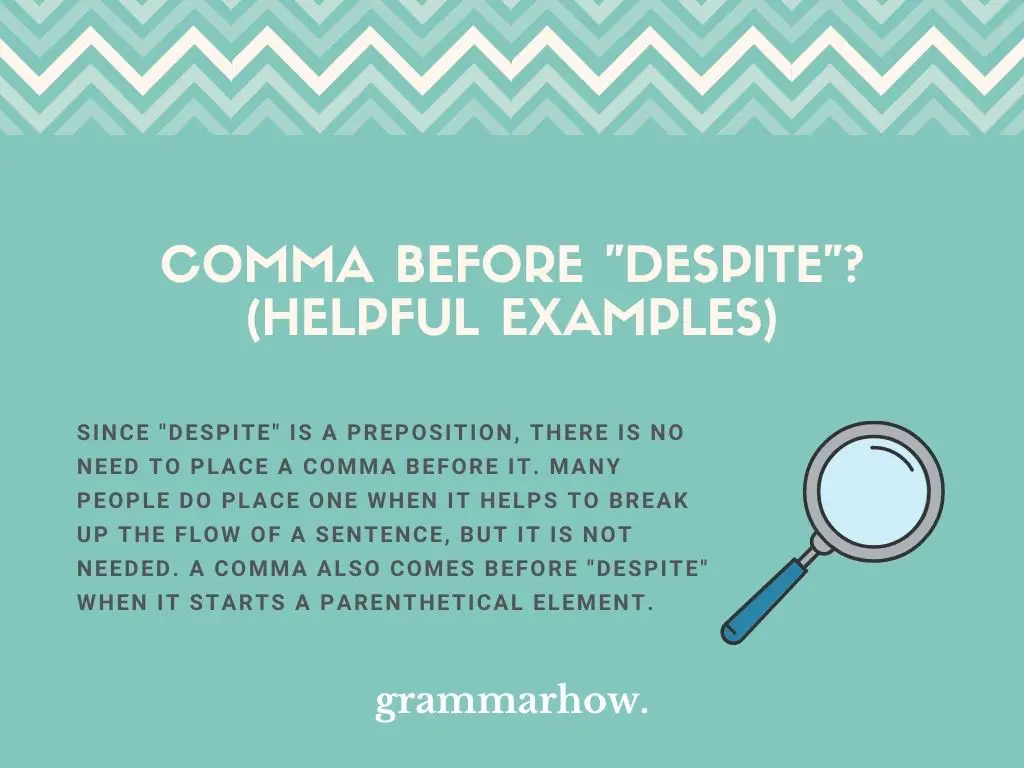“Despite” is one of those words that can seemingly appear anywhere in a sentence. When it does appear, it’s important to know what punctuation you need to use it correctly. This article will explore where to place a comma when you use “despite.”
Comma Before “Despite”?
Since “despite” is a preposition, there is no need to place a comma before it. Many people do place one when it helps to break up the flow of a sentence, but it is not needed. A comma also comes before “despite” when it starts a parenthetical element.

To help demonstrate this, you can refer to these examples:
- I did not want to do any of that, despite being told that I needed to.
- I did not want to do any of that despite being told that I needed to.
Both of these sentences are grammatically correct. They are also identical. The only difference is that the second example does not use a comma. It is entirely up to you to determine whether the comma is necessary.
Commas help to break up the flow of the sentence, but they are not required.
Comma Before “Despite” in the Middle of a Sentence
You should place a comma before “despite” in the middle of a sentence when it is the first word of a parenthetical element. You might also want to place a comma beforehand when it is used at the start of a dependent clause, but this is not required.
For a parenthetical element, “despite” works like this:
- He did not go to the movie, despite his best intentions, because he was told to avoid her.
- The restaurant, despite loads of negative reviews, was actually quite tasty.
Also, if you include it at the start of a dependent clause, you can use it like this:
- She was going to talk to him about it later in the day, despite so many people advising her against it.
- I wanted you to be there with me, despite you making it clear that you weren’t interested.
Comma Before “Despite” at the End of a Sentence
“Despite” should never have a comma before if it is the only word at the end of a sentence. The only time when a comma might come before it is if “despite” introduces the final clause of the sentence. This is an optional comma choice, though.
Here are some examples to show you how it works:
- I will not go with her, despite what she said.
- They were going to talk about their differences, despite everything.
Comma Before “Despite the Fact”?
“Despite the fact” is an extension of “despite.” It follows the same rules, meaning that you do not need to place a comma beforehand. However, the comma can be useful if you would like to break up the flow of the sentence to be more readable.
If you do choose to use the comma, it works like this:
- I was going to make it easier for all of them by leaving, despite the fact that none of them deserved that from me.
- You made some valid arguments about this case, despite the fact that someone still got hurt at the end of it.
You may avoid using the comma, and these examples will show you how that works:
- I’m not going to be there for you anymore despite the fact that I still care about you.
- I’m trying to talk to her despite the fact that she doesn’t care at all.
Comma After “Despite”?
A comma should only come after “despite” when it is used as a noun to mean “despise” or “hate.” Even when used this way, the comma only applies if it comes at the end of a parenthetical element or clause.
“Despite” is not commonly used in this way, so you won’t often hear it from native speakers. Many native speakers won’t even realize that “despite” means “hatred” or “disdain.” It is a fairly archaic meaning, and it is rarely used today.
Still, this is how it would look with a comma after it:
- Due to Mary’s despite, there wasn’t much that we could do about it. We had to leave.
- I will be there, even though I have a lot of despite, because I know that they are relying on me.

Martin holds a Master’s degree in Finance and International Business. He has six years of experience in professional communication with clients, executives, and colleagues. Furthermore, he has teaching experience from Aarhus University. Martin has been featured as an expert in communication and teaching on Forbes and Shopify. Read more about Martin here.

